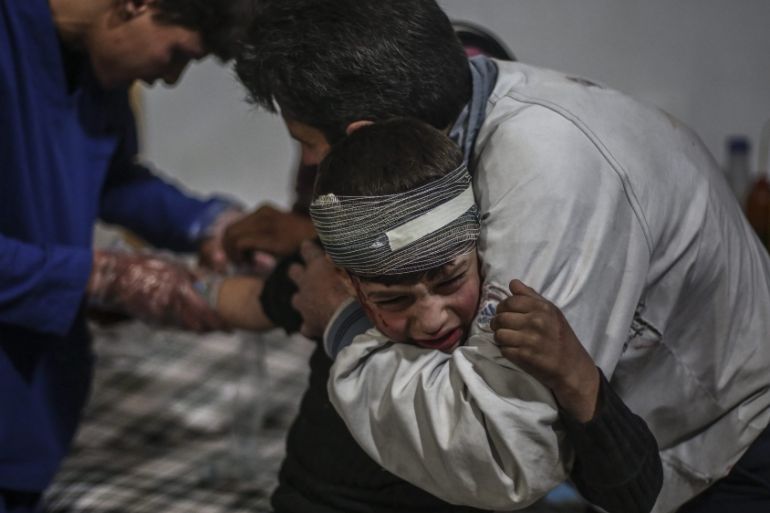Syrian opposition groups to hold unity talks in Riyadh
Iran criticises meeting in Riyadh aimed at unifying rebel positions before potential negotiations with Assad government.

A Syrian opposition meeting is due to begin in Saudi Arabia that will discuss ways to overcome their differences before potential talks with the government of President Bashar al-Assad.
The talks, due to take place from Tuesday, are seen as the most serious effort yet to unify the opposition groups, a step considered vital to peace talks sought by world powers but which has angered Iran.
Keep reading
list of 4 itemsThe Take: Thirteen years later, has the world forgotten Syria?
Jordan army kills drug runners at Syria border amid soaring Captagon trade
Assad arrest warrant: ‘Hope and pain’ for Syrian chemical attack survivors
Adel al-Jubeir, Saudi Arabia’s foreign minister, had said last week that his country was in contact with various Syrian opposition groups about the meeting, in the run-up to peace talks in Vienna due in January.
|
|
“Riyadh is trying to bring as broad a cross-section of Syrian opposition groups as possible,” Jubeir had said, adding that groups on “terrorist lists” such as the Islamic State of Iraq and the Levant (ISIL) would not be part of the talks.
The Riyadh meeting is meant to bring rebels, or those who represent them, to the table when negotiations begin.
However, Iran has said the meeting is aimed at harming the Vienna peace talks and would cause their failure.
The Vienna process envisages formal talks between the Syrian government and the opposition by January 1.
The Syrian National Coalition, headed by Khaled Khoja, aims to replace Syria’s current leadership with a transitional government after achieving international recognition.
“When we held a meeting with the Saudis a while back they made it clear that Bashar al-Assad is not, and will not, be part of any peace process or transitional government in Syria,” SNC’s Nagham al-Ghadri had told Al Jazeera.
“There will be no one representing the Syrian government in the three-day talks in Riyadh. This meeting is only for the Syrian opposition. The aim is to unify and hopefully agree on one document to be able to propose in the Vienna talks in January.
“We need to prepare for the transitional period that we hope Syria will go through soon. We want to prove to the international community that keeps criticising our efforts to unite, that we can agree and move forward with one goal. That is the aim of the Riyadh talks. We want to prove we can unite.”
OPINION: Dropping more bombs on ISIL will not save Syria
Assad’s future
While the outlook for the political track recently launched in Vienna appears bleak – international divisions over Assad persist and the war in Syria has escalated – the Riyadh meeting offers the prospect of forging a more united opposition better able to negotiate with the government.
Assad’s opponents and the governments that back them see it as a long-overdue step towards ending the disunity that has obstructed diplomacy: the Turkish-based political opposition that led the last round of failed peace talks two years ago was widely criticised as out of touch with forces on the ground.
|
|
Meanwhile, Syrian Kurdish factions will also host a two-day conference from Tuesday on a vision for Syria’s future, after being excluded from the meeting in Saudi Arabia, according to the AFP news agency.
Opposition and Kurdish sources said the conference would be held in northeast Syria and will include Kurds, the Assyrian Democratic Party, Arab figures and religious leaders from various parts of Syria.
Kurdish conference organiser Sihanuk Dibo said the overlap with the Riyadh meeting was “unintentional”, but it comes after Kurdish political figures protested their exclusion from the Saudi-hosted talks.
The Syrian government, meanwhile, has released 35 opposition activists in the city of Homs.
The release is part of a ceasefire deal which will lead to the withdrawal of up to 2,000 rebels in the Waer neighbourhood.
Diplomacy towards ending the nearly five-year conflict has accelerated since Russia deployed its air force to mount strikes in support of the Syrian army.
Iran has also intervened with more forces since then. Hundreds of its elite Revolutionary Guard Corps are fighting alongside the Syrian army in ground offensives being waged with Russian air cover in several areas of western Syria.
Saudi Arabia has in turn boosted support to the rebels. The Saudi foreign minister added last month that a military option in Syria was still viable and support for the opposition fighting to topple Assad would continue.
